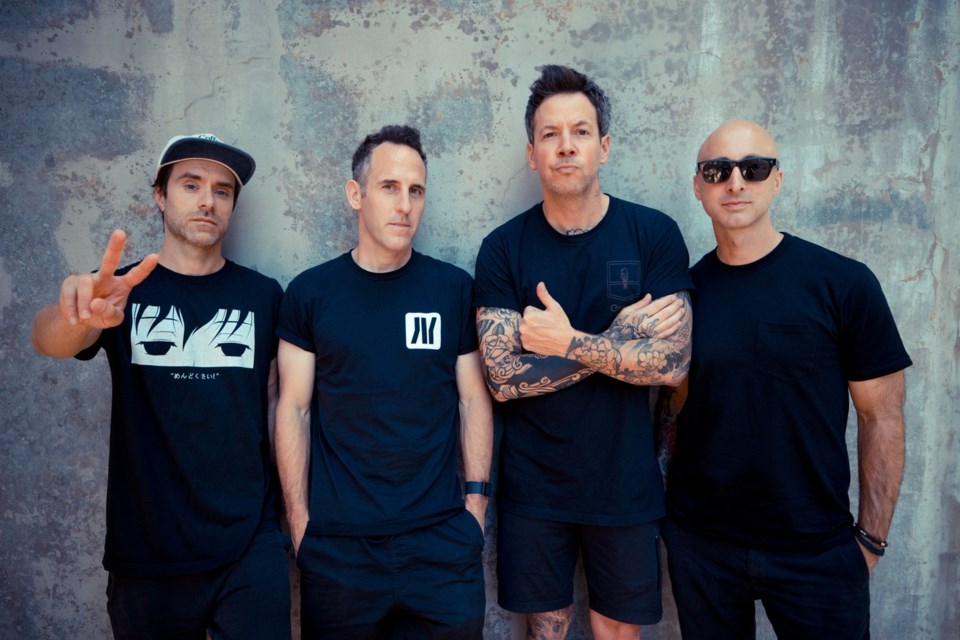TORONTO — The problem with so many rock documentaries is they too often come out as the artist winds down their career — at least that's how pop-punk act Simple Plan see it.
With their new career-spanning feature-length doc, which premiered this month on Prime Video, the Montreal pop-punk act says they didn't want to follow the pack and hold out until the sunset of their lives to share the ups and downs.
“Sometimes bands ... wait until super late, until they're really old,” 45-year-old drummer Chuck Comeau explained in a recent video interview.
“Why not kick off a whole new chapter, look back on what we've accomplished, and use this to start the next part of the story?”
Luckily, Simple Plan has plenty of fresh material to talk about. The band has recently been swept up by a resurgence in popularity for their early 2000s hits, thanks in part to TikTok clips that have introduced their pop-punk anthems "I'm Just a Kid" and "Perfect" to a new generation.
The unexpected popularity has attracted bigger crowds than ever to their shows, just as the group passes their 25th anniversary.
"Simple Plan: The Kids in the Crowd,” from music video director Didier Charette of Hawkesbury, Ont., a town on the border of Ontario and Quebec, skirts much of the ugliness and complications of mainstream fame to focus on the band's rise and enduring appeal.
Members recall the odds they overcame as French-Canadian suburbanites seeking stardom in the English music market without much of a blueprint to work from.
"There was nobody coming from Montreal, speaking French, that had done it," Comeau said.
"The only reference point, I guess, was Celine Dion."
Charette's documentary feature debut relies heavily on archival footage in recounting the earliest days of Simple Plan's precursor band, Reset. They formed in the mid-1990s as a group of high schoolers that included Comeau and Simple Plan lead vocalist Pierre Bouvier. While that band found some success, Comeau and Bouvier left amid personal squabbles.
The two made amends and joined forces with local musicians Jeff Stinco and Sébastien Lefebvre to form Simple Plan in 1999. They pursued a major label record deal, eventually landed one, and then jumped the typical hurdles of the music industry.
Some critics derided the band as too soft for modern rock, often comparing them to their brattier Canadian counterparts Sum 41. One music magazine stung them with the most backhanded of praise, labelling them "good guys, bad band."
Meanwhile, some audiences openly displayed their disdain, with festival concertgoers actually whipping water bottles at the band during their live sets.
To Simple Plan, these experiences were obstacles to overcome.
"The process of going through this old footage ... was really a nice way to ... give ourselves a pat on the back and say, 'Hey, we're doing pretty good,'" Bouvier said.
"We don't do that enough," Comeau agreed.
Bouvier concedes those early negative incidents might've left the band with emotional battle scars and a drive to prove their worth.
"We had a chip on our shoulder," he said.
"And a way for us to overcome those haters, so to speak, (was to say) we're going to give the best show ever and ... there's no way you're going to walk away saying that that wasn't a great show."
Avril Lavigne, Mark McGrath of Sugar Ray and Mark Hoppus of Blink-182 are among the band's contemporaries who come to their defence in new interviews.
Other significant moments in Simple Plan's history are downplayed by the film, in particular, the departure of the longtime bassist David Desrosiers following allegations of sexual misconduct involving one of the band's fans.
In 2020, Desrosiers left the band following accusations from an anonymous person on social media that alleged he made inappropriate “jokes” with her when she was a minor and that they had consensual sex after she came of age. She also alleged he invited others for group sex without asking her, and threatened and demeaned her.
At the time, Desrosiers acknowledged that "some of the interactions I have had with women have caused them harm" and he pledged to seek professional help.
The documentary spends little time on the allegations. While Desrosiers appears in archival footage, he is not interviewed in present day. Even the current band members only discuss the incident in the vaguest of ways, offering very little insight into how suddenly losing one of their members affected them as a unit.
Comeau described Desrosiers' exit as “one of the most challenging moments in our career."
"It comes with a lot of pain," he said.
“He was very important to the band. He had a huge contribution musically and personally … and we wanted to make sure the movie would reflect that.”
While the band hasn't "had tons of interactions" with Desrosiers since he left, Comeau said they consulted him during production and showed him a cut of the documentary.
"We felt like we couldn't avoid David because he was a big part of the story," he added.
"He wasn't interviewed, but we really wanted his contribution to be shown."
Comeau said Simple Plan wanted to make clear in the documentary that their priority was "to regain the trust of our fans and make sure that we could move forward as a band."
"Now it's the four of us, and it's been five years," he added. "I think we feel like there's another 25 years in us."
This report by The Canadian Press was first published July 16, 2025.
David Friend, The Canadian Press



